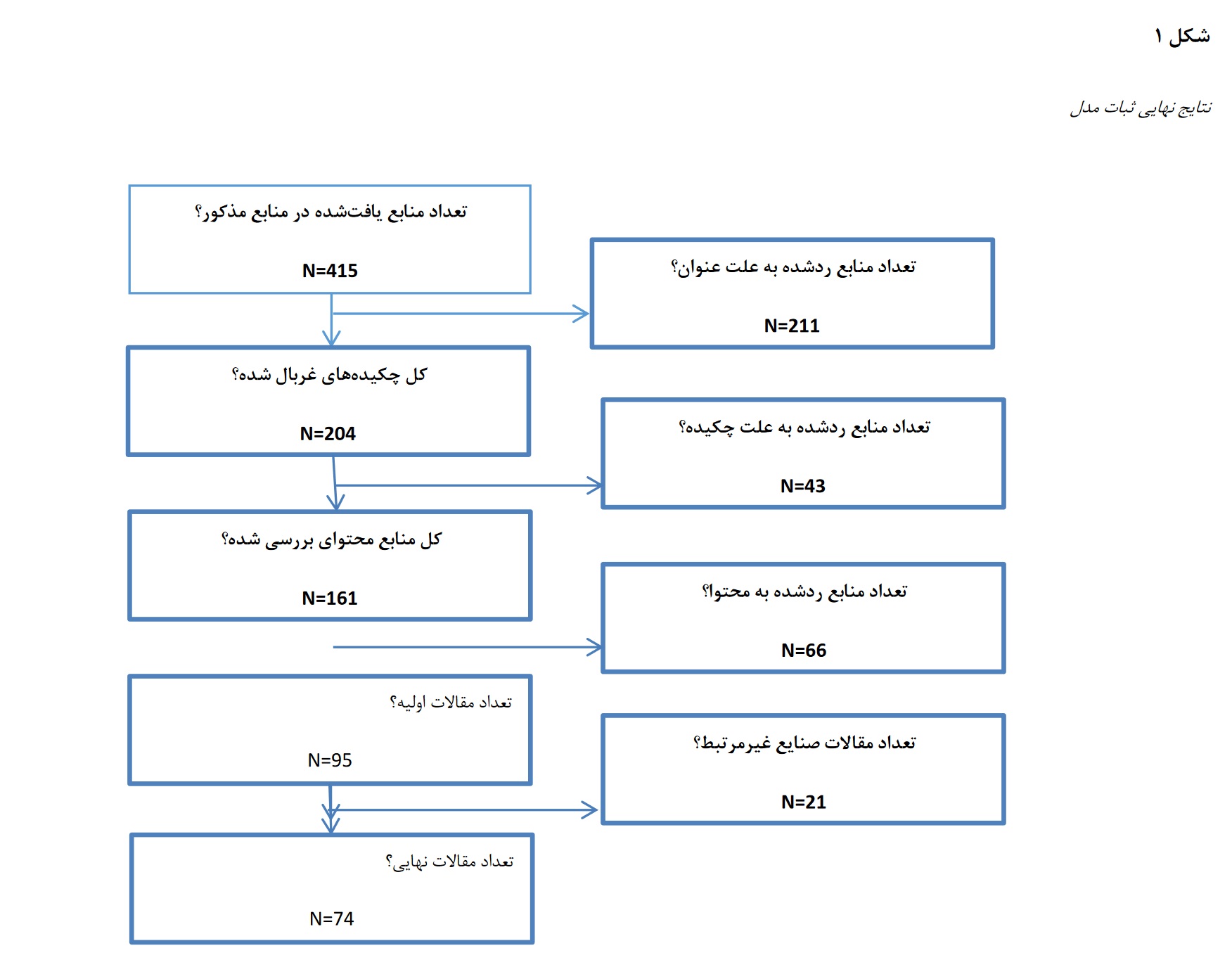Designing a Marketing Policy Package in Free Trade Zones with an Efficiency Approach (Case Study: Arvand Free Trade Zone)
Keywords:
Marketing Policy Package, Free Trade-Industrial Zones, Arvand, Meta-synthesis MethodAbstract
This study aims to design a marketing policy package in free trade zones, specifically focusing on the Arvand Free Trade Zone. The statistical population for the meta-synthesis section comprises 415 articles on marketing policies, from which 47 articles were selected using the Barroso and Sandelowski method (2007). In the Delphi section, the statistical population includes all experts, academic faculty members, and members of the Free Trade Zone organizations, totaling 40 individuals, with 15 selected purposefully as the sample. Data collection tools in this study include the CASP questionnaire and Delphi rounds questionnaires. To obtain the reliability of the research instruments in the quantitative section, Cronbach's alpha method was used. Given the nature of the research, both qualitative and quantitative methods were employed. Through the meta-synthesis method, 12 components and 56 indices were identified within the frameworks of political marketing strategic planning, strategic capabilities, operational capabilities, practical capabilities, internal capabilities, external capabilities, geographical aspects, social and cultural aspects, political aspects and political decision-making, government policies, economic aspects and economic management, and institutional contexts. Using the Delphi method and conducting two rounds, the components were reduced to 11 with 51 indices. Subsequently, considering the filtered policies of the free trade zones, a marketing policy proposal for the free trade zones was developed and designed in the form of mother policies (main actions), supportive barrier-removing policies, and supportive facilitating policies.
Downloads
References
Ahmadi, F., Askari, Ahmad, Rousta, Alireza. (2023). Identification of Dimensions and Components of Customer
Marketing of Iran's Tourism Industry with a Quality Method. Journal of value creating in Business Management,
(4), 46-60. https://doi.org/10.22034/jvcbm.2023.389054.1058
Baranibyranvand, N., & Georgian Chalsbari, E. (2023). Investigating the position of social media based marketing in
small and medium enterprises in Lorestan province in the context of Corona crisis from the perspective of managers
and their owners. Emergency Management, 11(3), 1-14.
Khalouei, A., Pourezat, Ali Asghar, Shamizanjani, Mahdi. (2014). The Role of Knowledge Management in E-Business
Strategy. Journal of Information Technology Management, 6(3), 375-394.
http://ensani.ir/file/download/article/1643779263-10491-2011-127.pdf
Mamipour, S., Besharati, Zahar, Behbudi, Davod. (2014). Investigation and Ranking of effective factor of Investment in
Anzali Free Zone. Journal of economics and regional development, 21(7), -.
https://doi.org/10.22067/erd.v21i7.24637
Ostadi Iraj, M., Soleimon Pouromran, Mahbobeh. (2017). The relationship between the organizational resilience and the
competitiveness and sustainable competitive (The case study: Cement Company of Bojnord). Journal of
management futures research, 28(108), 103-125. https://www.sid.ir/paper/204157/en
Panahifar, Y., Khoshchehreh, Mohammad, Hamidizadeh, Mohammadreza, Monavarian, Abbas. (2021). Designing of
policy-making model for the development of non-oil exports in free zones. Iranian Journal of Public Policy, 7(2),
-185. https://doi.org/10.22059/jppolicy.2021.82725
Pirjamadi, S., Motahhari, Morteza, Karoubi, Mehdi, Mahmoudi, Ahmad. (2022). Identifying Marketing Feasibility
Indicators of Sports Tourism Development in Free Trade, Industrial, And Economic Zones in Iran. Tourism
Management Studies, 17(57), 47-78. https://doi.org/10.22054/tms.2022.65108.2653
Rabiei, M., Shahroodi, K., Chirani, E., & shabgoo monsef, s. m. (2024). the competencyies of future marketing specialists
for the development of the insurance industry. Journal of Business Administration Researches, no(no), 111-139.
https://doi.org/10.22034/jbar.2024.19759.4288
Zaj, Z., Albonaiemi, Ebrahim, Khodamoradi, Mohammad. (2023). Designing an effective model Regarding the
attractiveness of the export market of Iran's free zones (Case of study: Arvand Industrial Free Zone). Industrial and
Organizational Psychology Studies, 9(2), 521-505. https://doi.org/10.22055/jiops.2023.42736.1329

Downloads
Published
Issue
Section
License

This work is licensed under a Creative Commons Attribution-NonCommercial 4.0 International License.










